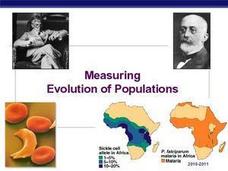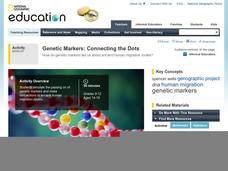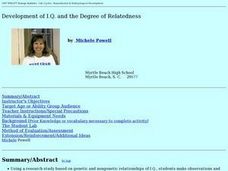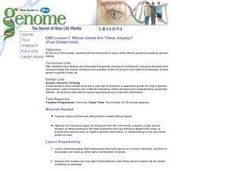Virginia Department of Education
Adaptation and Evolution
Um may be the atomic symbol for confusion, but it won't be needed in this lesson. Scholars rotate through seven stations completing experiments, hands-on activities, writing exercises, and analysis. Stations include material on...
Curated OER
Proteins
Vocabulary that is essential to this topic is introduced and defined at the start of this slide show. The following slides help students understand proteins and their use and involvement in everyday substances. Great diagrams help your...
Curated OER
Human Genetic Diseases
Although there are a few missing titles in this collection of slides, if your class has the support of a genetic disease lecture to accompany it, this resource will be very useful. The mechanism of genetic inheritance is covered. Flow...
Curated OER
Measuring Evolution of Populations
The five agents of evolutionary change are reviewed in this slideshow. Definitions of common terms involved with populations and equilibrium are given, and there are some presentations of Hardy Weinberg equations for common examples of...
National Geographic
Genetic Markers: Connecting the Dots
Biology buffs simulate how genetic markers are passed among populations in order to understand how these markers can help anthropologists map human migration. A couple of volunteers leave the room while you walk the remaining learners...
Curated OER
Plant Biotechnology: Controlling Tissue Differentiation
Young scholars demonstrate hormonal control of plant tissue differentiation and relate this differentiation to gene expression. They explore the effects of hormones (auxin and cytokinin) on the genes that control tissue differentiation...
Curated OER
From Genomes of Species
Pupils investigate genomic research being done and its potential for understanding, treating, and possibly curing human genetic conditions. The potential of proteomic research as a companion to the work being done with genomics is...
Curated OER
Extracting DNA
Students explore DNA, genes, chromosomes and the chemicals that make up DNA. They research Internet resources to develop their knowledge of DNA. They conduct an experiment to separate DNA from peas and create a poster that they can use...
Curated OER
Science: Designer genes
Students engineer new organisms using biotechnology. In small groups, they write procedures, list benefits and drawbacks, and explain how their new organism might affect the environment. After creating their new organisms, they present...
Curated OER
Probability and Genetics
Pupils determine the offspring from a genetic cross. In this biology activity, students use Punnett squares to find probability. They explain how genes are passed from parents to offspring.
Curated OER
DNA-a Molecular Identity
Young scholars explore about what DNA is and several different DNA typing techniques. They examine three different situations where DNA typing was used to carry out justice. Students also identify and evaluate different uses of DNA...
Curated OER
Genetics- You Are Unique
Students identify inherited traits. For this genetics lesson, students participate in a discussion about traits and use a checklist to identify inherited traits. Students complete a hand-out.
Curated OER
Development of I.Q. and the Degree of Relatedness
Studnets, in groups, analyze data regarding genetic and nongenetic relationships of I.Q. They make observations and discuss correlations from a diagram. Cooperative learning teams discuss a given set of questions and present information...
Curated OER
Natural Selection in Protected And Unprotected Populations
Studnets compare how two elephant seal populations fare during successive generations. They participate in a simulation using a card game to look at the differences in two populations, one that is protected from mortality by human...
Curated OER
Genetics
Learners explain the difference between dominant and recessive genes, identify what causes differences in the traits of parents and their offspring, and explain how sex is determined. They will also improve their reading and...
Curated OER
Dragon Genetics Lab-Principles of Mendelian Genetics
Students study genetic traits using popsicle sticks as chromosomes. In this biology lesson, students explain how traits are inherited from parents. They differentiate dominant and recessive genes.
Curated OER
The Chemistry Connection
In this proteins instructional activity, students read about the chemical compound, protein. Students determine where proteins are found in the body and how enzymes help the body react. Then students complete 3 short answer questions.
Curated OER
Homologous Shoes
Students examine the concept of homology by observing their shoes and those of their classmates. They summarize the observations of everyone's shoes relating it to chromosomes in cells. They share their observations with the class.
Curated OER
Stem Cells and Cloning
Students discuss an article on cloning and stem cells and complete an Internet cloning activity. In this genetic engineering lesson, students analyze stem cell issues by reading an article and participating in a class discussion. They...
Curated OER
Intermediate Level: Clauses and Sentence Structure
In this clauses and sentence structure worksheet, students read 5 sentences and underline the independent clauses and circle each dependent clause. Students then read 15 sentences and indicate if there are any grammatical errors.
Curated OER
Identifying Disease Genes using BLAST
Students navigate the National Center for Biological Information (NCBI) website and BLAST program to conduct a variety of biological assignments.
Curated OER
Genetically-Modified Food
Young scholars investigate the pros and cons of genetic engineering. They watch a short Bill Moyers video, conduct Internet research, create a poster, participate in a pro/con debate, and write an essay expressing their personal feelings...
Curated OER
Whose Genes Are These, Anyway?
Students explore some of the ethical questions raised by genetic testing. They answer the question of whom, if anyone, has rights to knowledge of each person's genetic make-up.
Curated OER
Why Do We Need Vitamin C in Our Diet?
Students compare/contrast the DNA sequence data of the rat GULO gene to the inactive human GULO gene. They translate and align the sequences, and propose a scenario to explain the occurrence of an inactive DNA sequence to that of an...

























